
OpenBB
Financial data platform for analysts, quants and AI agents.
Stars: 51893
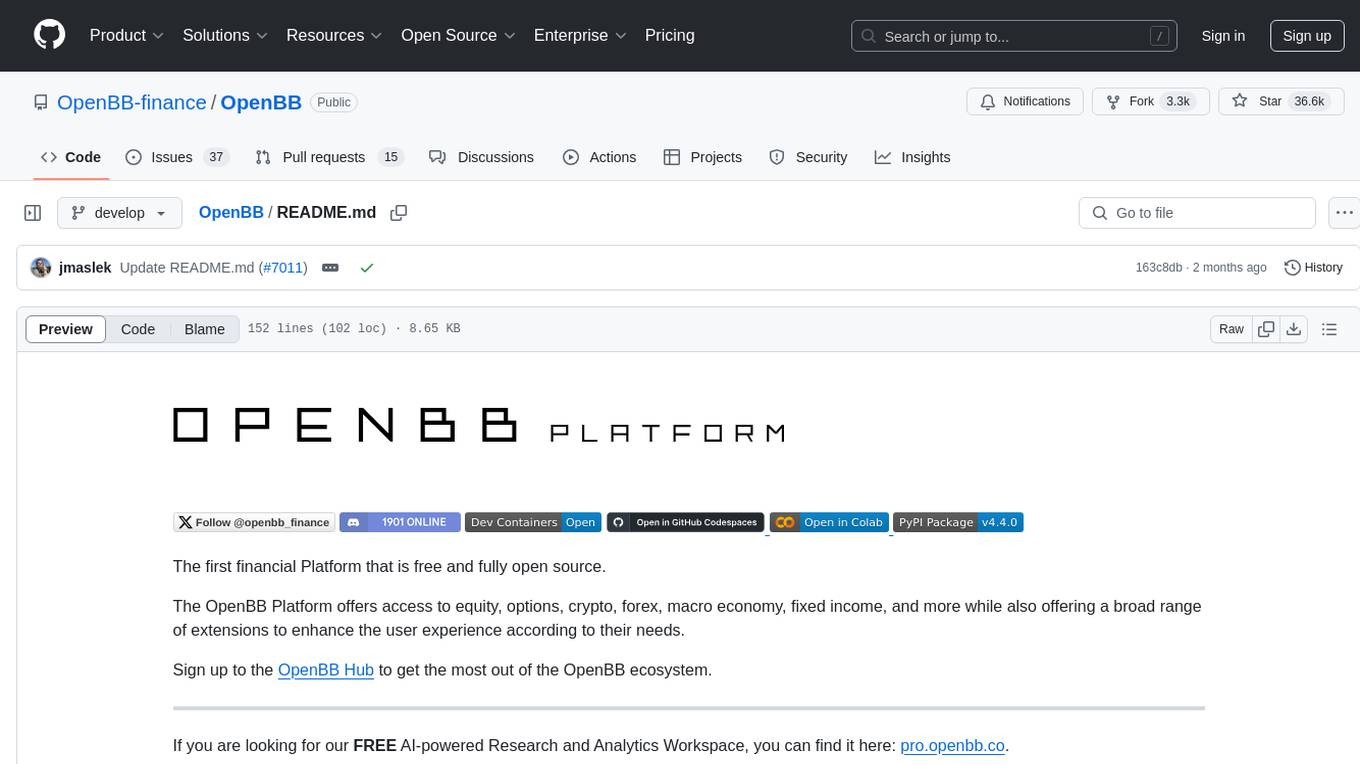
The OpenBB Platform is the first financial platform that is free and fully open source, offering access to equity, options, crypto, forex, macro economy, fixed income, and more. It provides a broad range of extensions to enhance the user experience according to their needs. Users can sign up to the OpenBB Hub to maximize the benefits of the OpenBB ecosystem. Additionally, the platform includes an AI-powered Research and Analytics Workspace for free. There is also an open source AI financial analyst agent available that can access all the data within OpenBB.
README:
The first financial Platform that is open source.
The OpenBB Platform offers access to equity, options, crypto, forex, macro economy, fixed income, and more while also offering a broad range of extensions to enhance the user experience according to their needs.
Get started with: pip install openbb
from openbb import obb
output = obb.equity.price.historical("AAPL")
df = output.to_dataframe()You can sign up to the OpenBB Hub to get the most out of the OpenBB ecosystem.
Data integrations available can be found here: https://docs.openbb.co/platform/reference
While the OpenBB Platform is all about an integration to dozens of different data vendors, the interface is either Python or a CLI.
If you want an enterprise UI to visualize this datasets and use AI agents on top, you can find OpenBB Workspace at https://pro.openbb.co.

Data integration:
- You can learn more about adding data to the OpenBB workspace from the docs or this open source repository.
AI Agents integration:
- You can learn more about adding AI agents to the OpenBB workspace from this open source repository.
Connect this library to the OpenBB Workspace with a few simple commands, in a Python (3.9.21 - 3.12) environment.
- Install the packages.
pip install "openbb[all]"- Start the API server over localhost.
openbb-apiThis will launch a FastAPI server, via Uvicorn, at 127.0.0.1:6900.
You can check that it works by going to http://127.0.0.1:6900.
Sign-in to the OpenBB Workspace, and follow the following steps:
- Go to the "Apps" tab
- Click on "Connect backend"
- Fill in the form with: Name: OpenBB Platform URL: http://127.0.0.1:6900
- Click on "Test". You should get a "Test successful" with the number of apps found.
- Click on "Add".
That's it.
The OpenBB Platform can be installed as a PyPI package by running pip install openbb
or by cloning the repository directly with git clone https://github.com/OpenBB-finance/OpenBB.git.
Please find more about the installation process, in the OpenBB Documentation.
The OpenBB Platform CLI is a command-line interface that allows you to access the OpenBB Platform directly from your command line.
It can be installed by running pip install openbb-cli
or by cloning the repository directly with git clone https://github.com/OpenBB-finance/OpenBB.git.
Please find more about the installation process in the OpenBB Documentation.
There are three main ways of contributing to this project. (Hopefully you have starred the project by now ⭐️)
- More information on our Contributing Documentation.
Before creating a ticket make sure the one you are creating doesn't exist already here
We are most active on our Discord, but feel free to reach out to us in any of our social media for feedback.
Distributed under the AGPLv3 License. See LICENSE for more information.
Trading in financial instruments involves high risks including the risk of losing some, or all, of your investment amount, and may not be suitable for all investors.
Before deciding to trade in a financial instrument you should be fully informed of the risks and costs associated with trading the financial markets, carefully consider your investment objectives, level of experience, and risk appetite, and seek professional advice where needed.
The data contained in the OpenBB Platform is not necessarily accurate.
OpenBB and any provider of the data contained in this website will not accept liability for any loss or damage as a result of your trading, or your reliance on the information displayed.
All names, logos, and brands of third parties that may be referenced in our sites, products or documentation are trademarks of their respective owners. Unless otherwise specified, OpenBB and its products and services are not endorsed by, sponsored by, or affiliated with these third parties.
Our use of these names, logos, and brands is for identification purposes only, and does not imply any such endorsement, sponsorship, or affiliation.
If you have any questions about the platform or anything OpenBB, feel free to email us at [email protected]
If you want to say hi, or are interested in partnering with us, feel free to reach us at [email protected]
Any of our social media platforms: openbb.co/links
This is a proxy of our growth and that we are just getting started.
But for more metrics important to us check openbb.co/open.
OpenBB wouldn't be OpenBB without you. If we are going to disrupt financial industry, every contribution counts. Thank you for being part of this journey.
For Tasks:
Click tags to check more tools for each tasksFor Jobs:
Alternative AI tools for OpenBB
Similar Open Source Tools

OpenBB
The OpenBB Platform is the first financial platform that is free and fully open source, offering access to equity, options, crypto, forex, macro economy, fixed income, and more. It provides a broad range of extensions to enhance the user experience according to their needs. Users can sign up to the OpenBB Hub to maximize the benefits of the OpenBB ecosystem. Additionally, the platform includes an AI-powered Research and Analytics Workspace for free. There is also an open source AI financial analyst agent available that can access all the data within OpenBB.
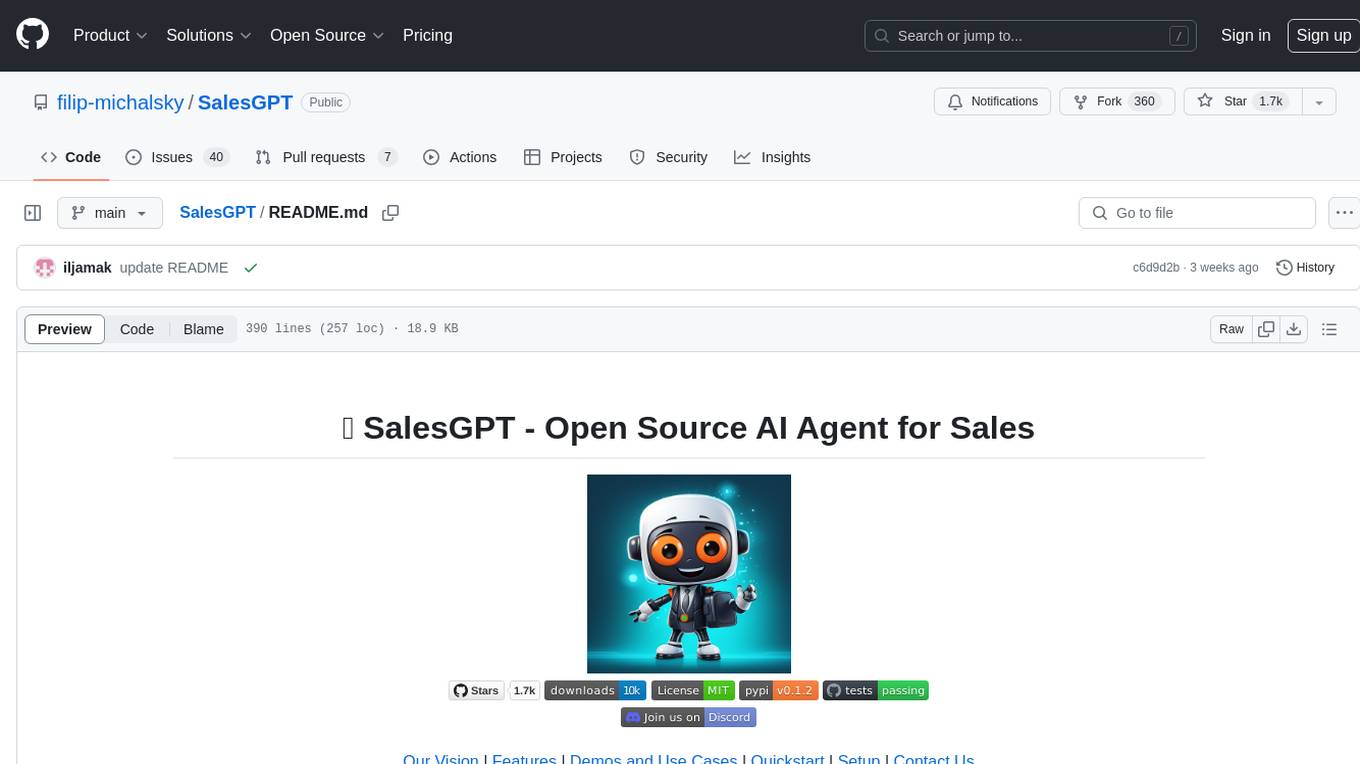
SalesGPT
SalesGPT is an open-source AI agent designed for sales, utilizing context-awareness and LLMs to work across various communication channels like voice, email, and texting. It aims to enhance sales conversations by understanding the stage of the conversation and providing tools like product knowledge base to reduce errors. The agent can autonomously generate payment links, handle objections, and close sales. It also offers features like automated email communication, meeting scheduling, and integration with various LLMs for customization. SalesGPT is optimized for low latency in voice channels and ensures human supervision where necessary. The tool provides enterprise-grade security and supports LangSmith tracing for monitoring and evaluation of intelligent agents built on LLM frameworks.

airbyte
Airbyte is an open-source data integration platform that makes it easy to move data from any source to any destination. With Airbyte, you can build and manage data pipelines without writing any code. Airbyte provides a library of pre-built connectors that make it easy to connect to popular data sources and destinations. You can also create your own connectors using Airbyte's no-code Connector Builder or low-code CDK. Airbyte is used by data engineers and analysts at companies of all sizes to build and manage their data pipelines.
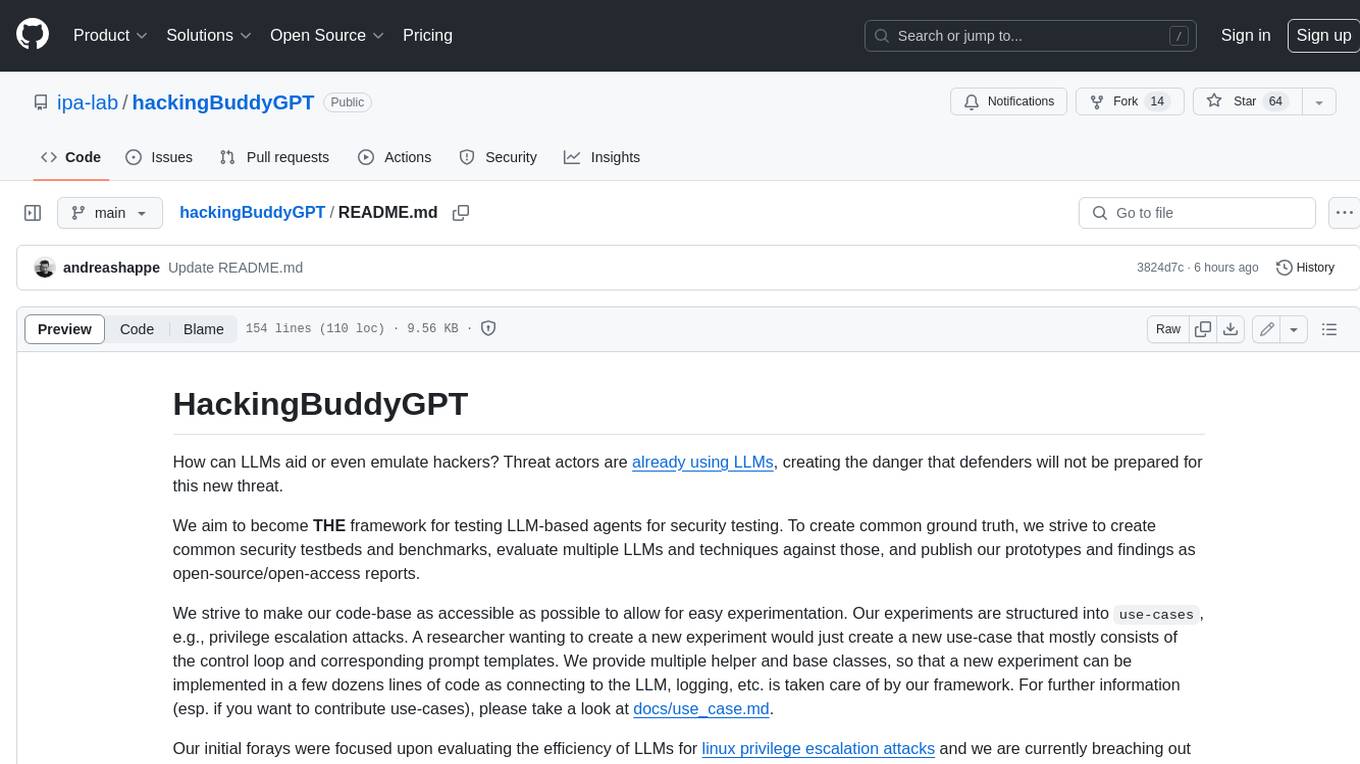
hackingBuddyGPT
hackingBuddyGPT is a framework for testing LLM-based agents for security testing. It aims to create common ground truth by creating common security testbeds and benchmarks, evaluating multiple LLMs and techniques against those, and publishing prototypes and findings as open-source/open-access reports. The initial focus is on evaluating the efficiency of LLMs for Linux privilege escalation attacks, but the framework is being expanded to evaluate the use of LLMs for web penetration-testing and web API testing. hackingBuddyGPT is released as open-source to level the playing field for blue teams against APTs that have access to more sophisticated resources.
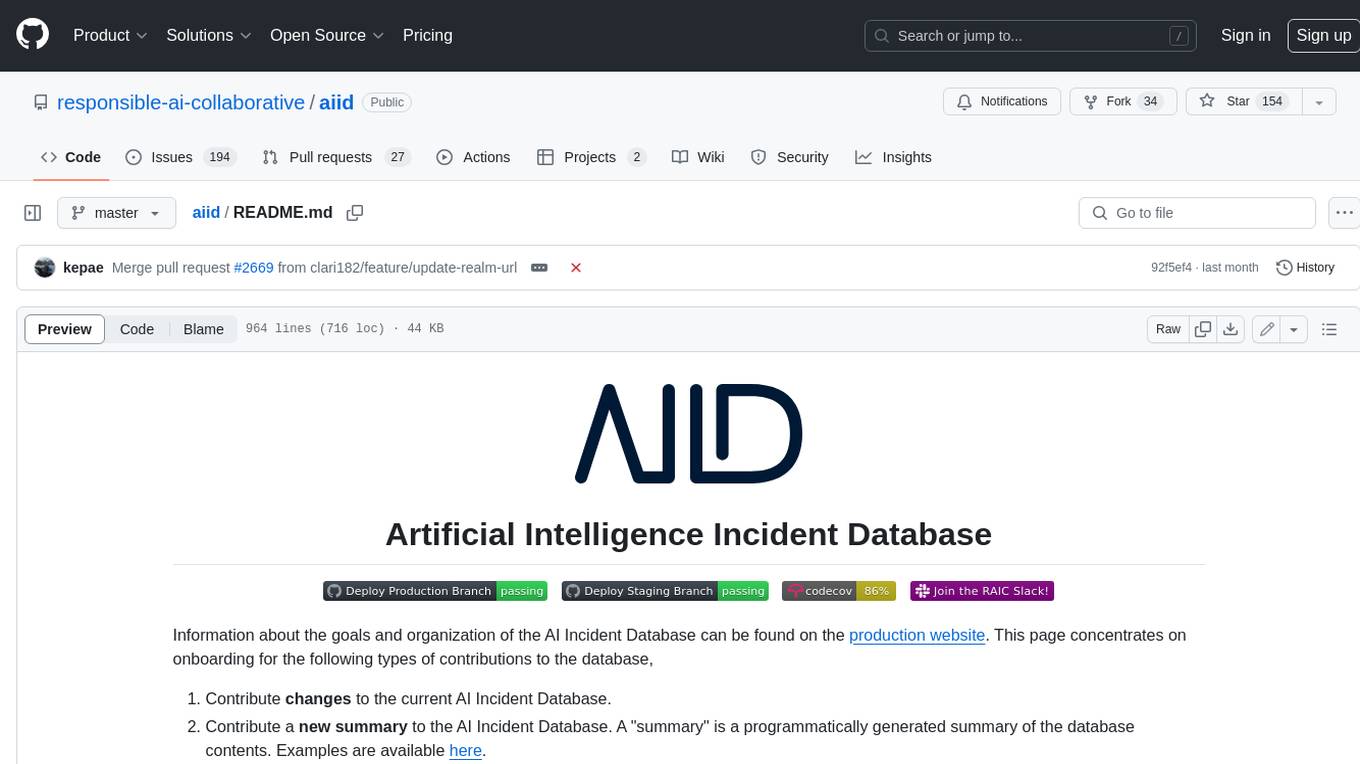
aiid
The Artificial Intelligence Incident Database (AIID) is a collection of incidents involving the development and use of artificial intelligence (AI). The database is designed to help researchers, policymakers, and the public understand the potential risks and benefits of AI, and to inform the development of policies and practices to mitigate the risks and promote the benefits of AI. The AIID is a collaborative project involving researchers from the University of California, Berkeley, the University of Washington, and the University of Toronto.
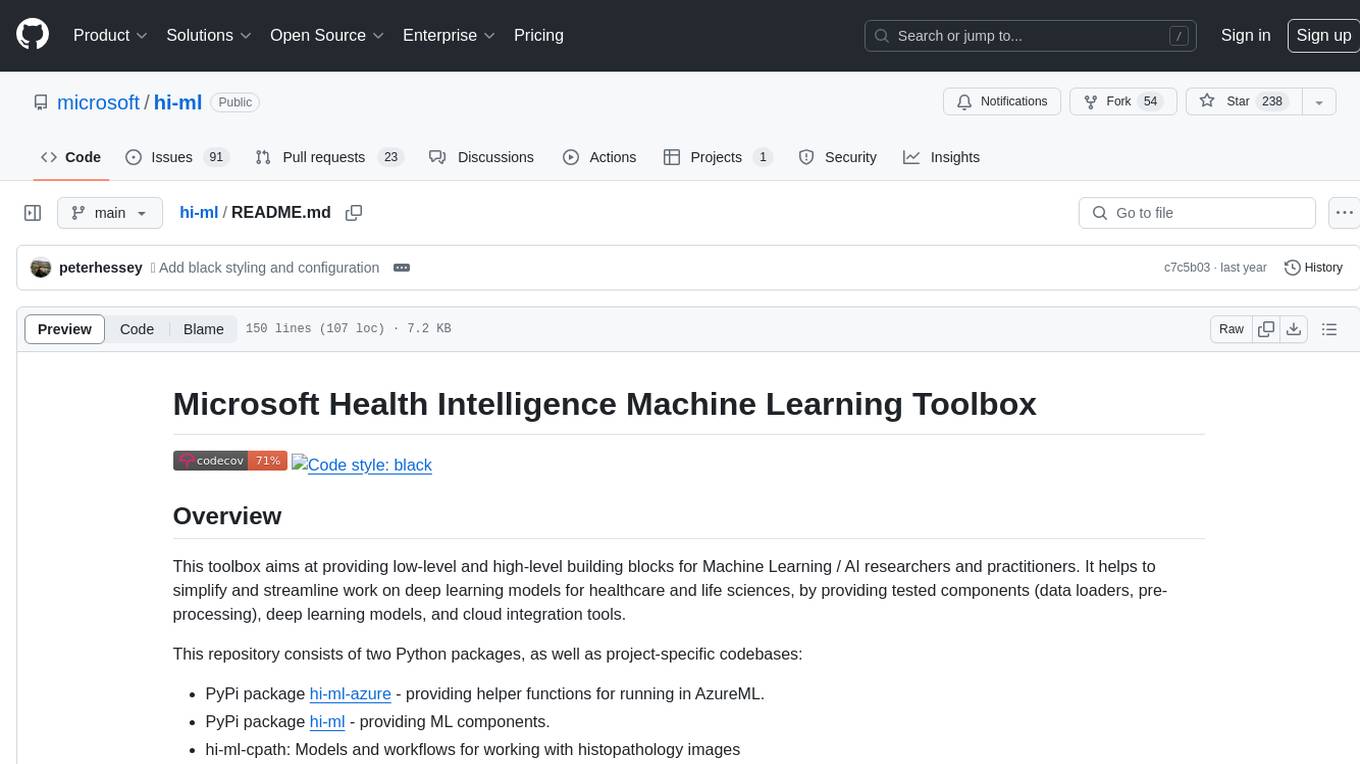
hi-ml
The Microsoft Health Intelligence Machine Learning Toolbox is a repository that provides low-level and high-level building blocks for Machine Learning / AI researchers and practitioners. It simplifies and streamlines work on deep learning models for healthcare and life sciences by offering tested components such as data loaders, pre-processing tools, deep learning models, and cloud integration utilities. The repository includes two Python packages, 'hi-ml-azure' for helper functions in AzureML, 'hi-ml' for ML components, and 'hi-ml-cpath' for models and workflows related to histopathology images.

morphik-core
Morphik is an AI-native toolset designed to help developers integrate context into their AI applications by providing tools to store, represent, and search unstructured data. It offers features such as multimodal search, fast metadata extraction, and integrations with existing tools. Morphik aims to address the challenges of traditional AI approaches that struggle with visually rich documents and provide a more comprehensive solution for understanding and processing complex data.
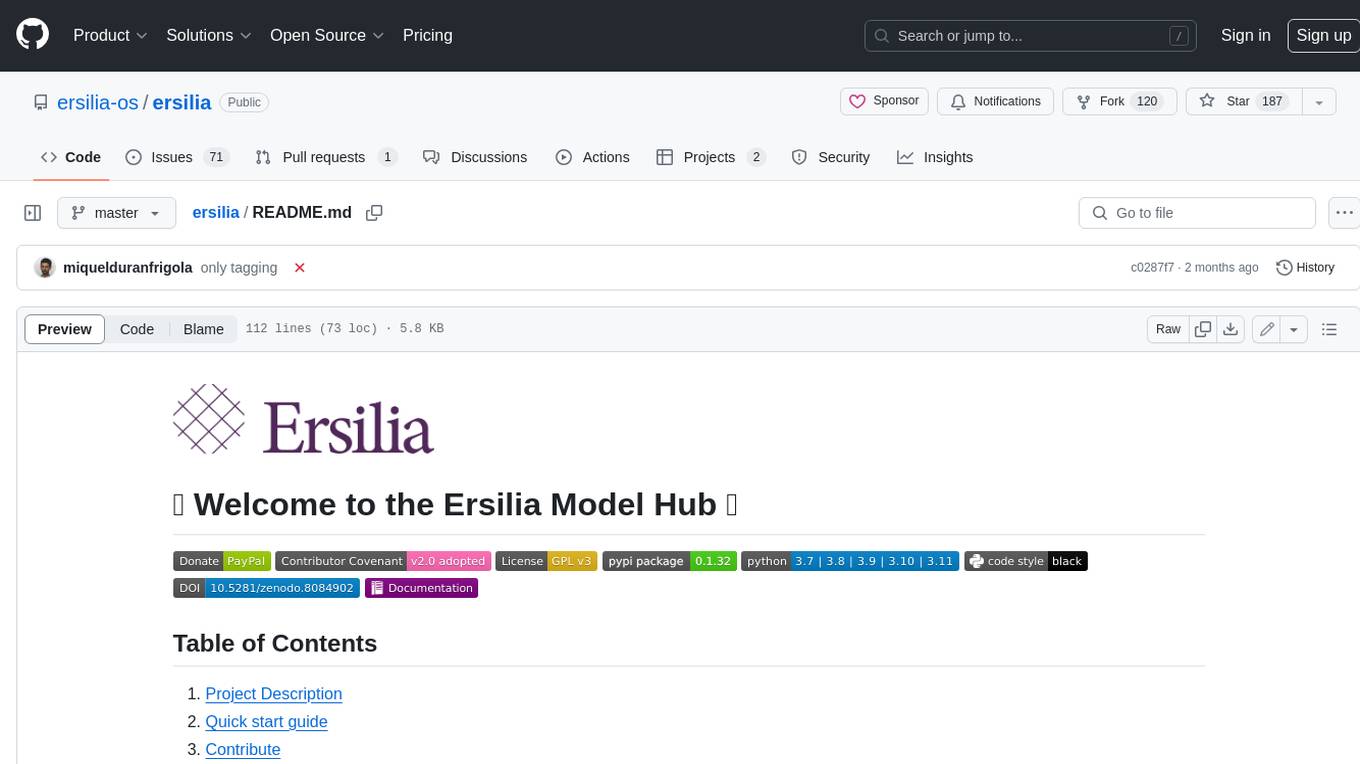
ersilia
The Ersilia Model Hub is a unified platform of pre-trained AI/ML models dedicated to infectious and neglected disease research. It offers an open-source, low-code solution that provides seamless access to AI/ML models for drug discovery. Models housed in the hub come from two sources: published models from literature (with due third-party acknowledgment) and custom models developed by the Ersilia team or contributors.

tracecat
Tracecat is an open-source automation platform for security teams. It's designed to be simple but powerful, with a focus on AI features and a practitioner-obsessed UI/UX. Tracecat can be used to automate a variety of tasks, including phishing email investigation, evidence collection, and remediation plan generation.
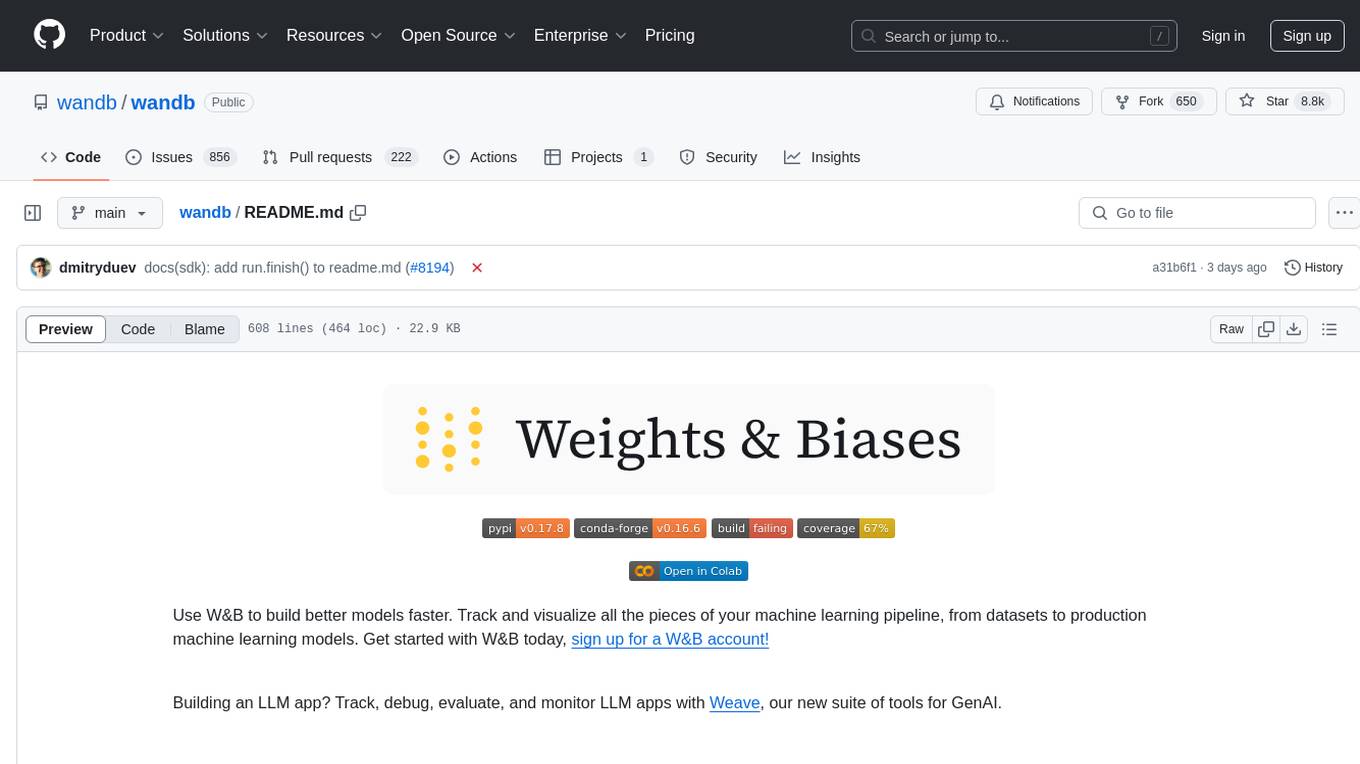
wandb
Weights & Biases (W&B) is a platform that helps users build better machine learning models faster by tracking and visualizing all components of the machine learning pipeline, from datasets to production models. It offers tools for tracking, debugging, evaluating, and monitoring machine learning applications. W&B provides integrations with popular frameworks like PyTorch, TensorFlow/Keras, Hugging Face Transformers, PyTorch Lightning, XGBoost, and Sci-Kit Learn. Users can easily log metrics, visualize performance, and compare experiments using W&B. The platform also supports hosting options in the cloud or on private infrastructure, making it versatile for various deployment needs.
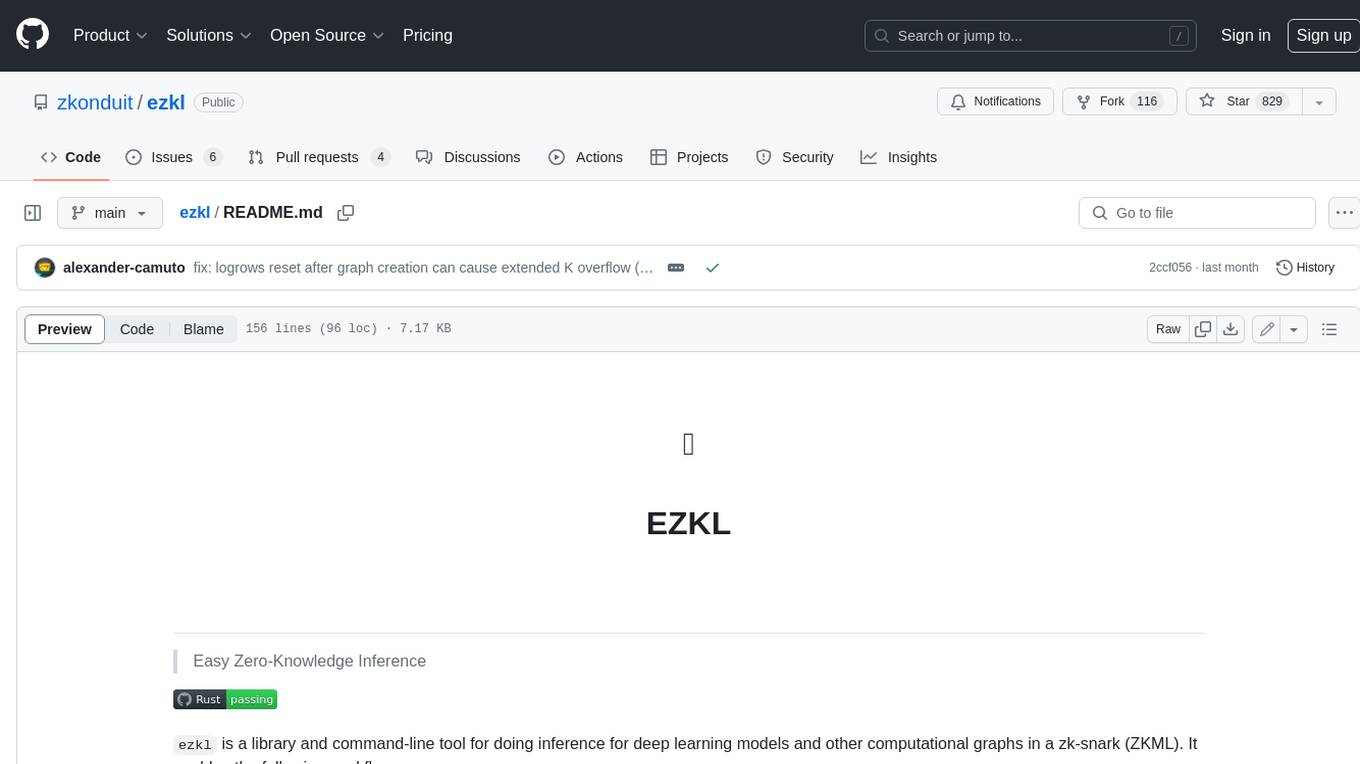
ezkl
EZKL is a library and command-line tool for doing inference for deep learning models and other computational graphs in a zk-snark (ZKML). It enables the following workflow: 1. Define a computational graph, for instance a neural network (but really any arbitrary set of operations), as you would normally in pytorch or tensorflow. 2. Export the final graph of operations as an .onnx file and some sample inputs to a .json file. 3. Point ezkl to the .onnx and .json files to generate a ZK-SNARK circuit with which you can prove statements such as: > "I ran this publicly available neural network on some private data and it produced this output" > "I ran my private neural network on some public data and it produced this output" > "I correctly ran this publicly available neural network on some public data and it produced this output" In the backend we use the collaboratively-developed Halo2 as a proof system. The generated proofs can then be verified with much less computational resources, including on-chain (with the Ethereum Virtual Machine), in a browser, or on a device.

LaVague
LaVague is an open-source Large Action Model framework that uses advanced AI techniques to compile natural language instructions into browser automation code. It leverages Selenium or Playwright for browser actions. Users can interact with LaVague through an interactive Gradio interface to automate web interactions. The tool requires an OpenAI API key for default examples and offers a Playwright integration guide. Contributors can help by working on outlined tasks, submitting PRs, and engaging with the community on Discord. The project roadmap is available to track progress, but users should exercise caution when executing LLM-generated code using 'exec'.
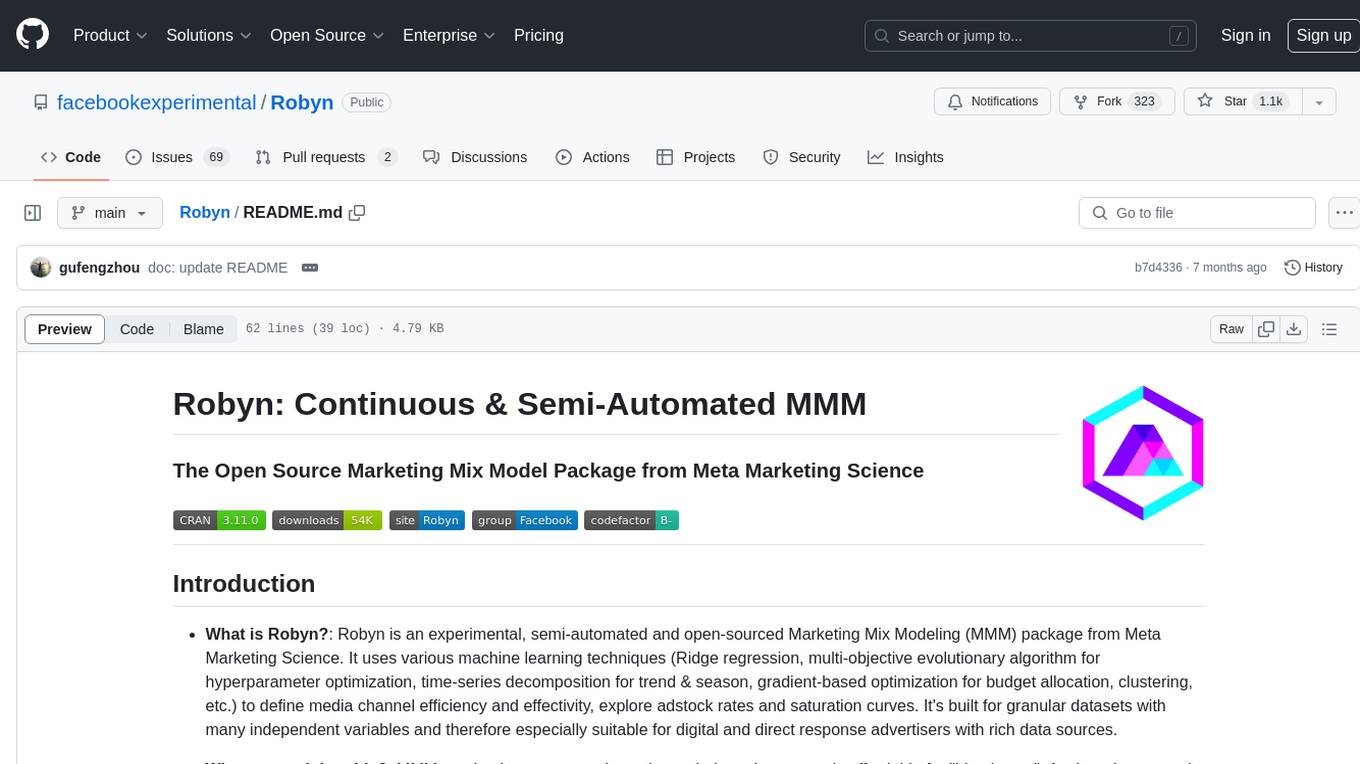
Robyn
Robyn is an experimental, semi-automated and open-sourced Marketing Mix Modeling (MMM) package from Meta Marketing Science. It uses various machine learning techniques to define media channel efficiency and effectivity, explore adstock rates and saturation curves. Built for granular datasets with many independent variables, especially suitable for digital and direct response advertisers with rich data sources. Aiming to democratize MMM, make it accessible for advertisers of all sizes, and contribute to the measurement landscape.
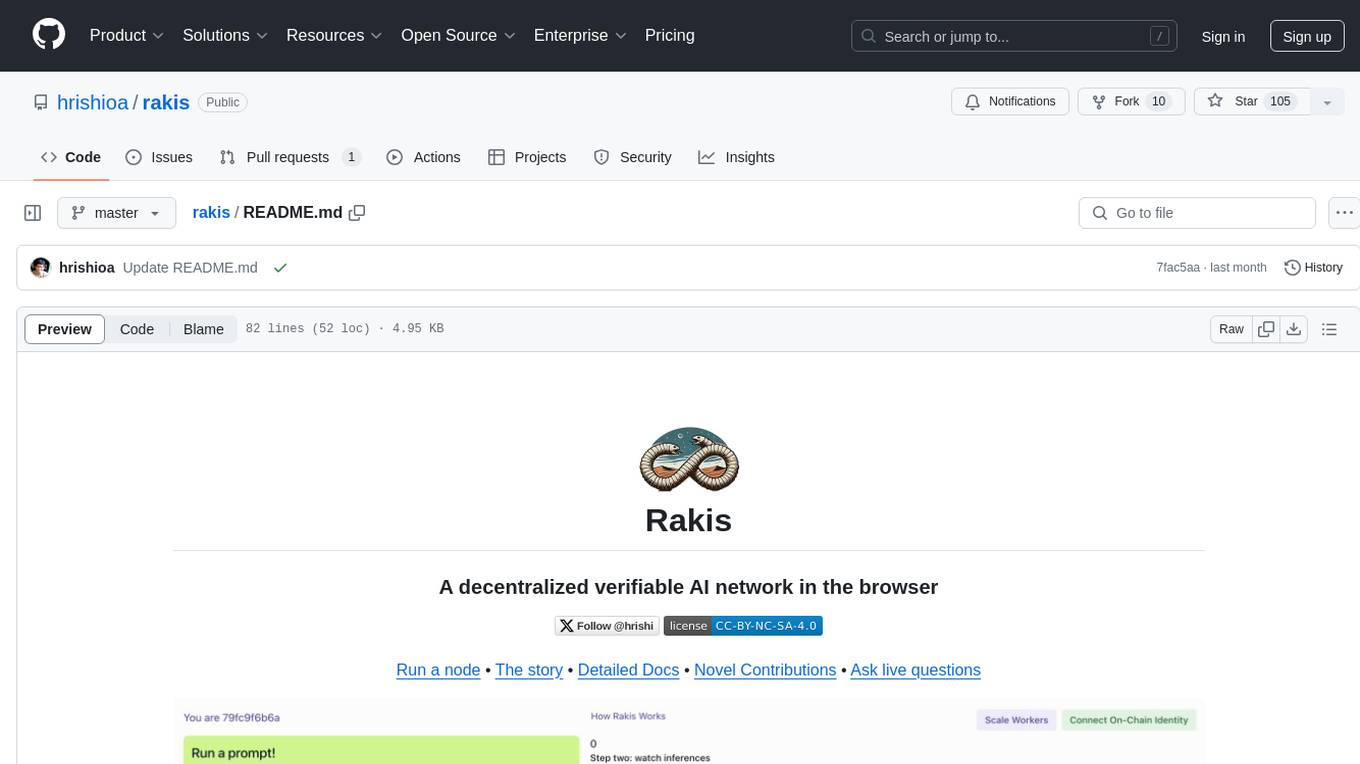
rakis
Rakis is a decentralized verifiable AI network in the browser where nodes can accept AI inference requests, run local models, verify results, and arrive at consensus without servers. It is open-source, functional, multi-model, multi-chain, and browser-first, allowing anyone to participate in the network. The project implements an embedding-based consensus mechanism for verifiable inference. Users can run their own node on rakis.ai or use the compiled version hosted on Huggingface. The project is meant for educational purposes and is a work in progress.

promptflow
**Prompt flow** is a suite of development tools designed to streamline the end-to-end development cycle of LLM-based AI applications, from ideation, prototyping, testing, evaluation to production deployment and monitoring. It makes prompt engineering much easier and enables you to build LLM apps with production quality.
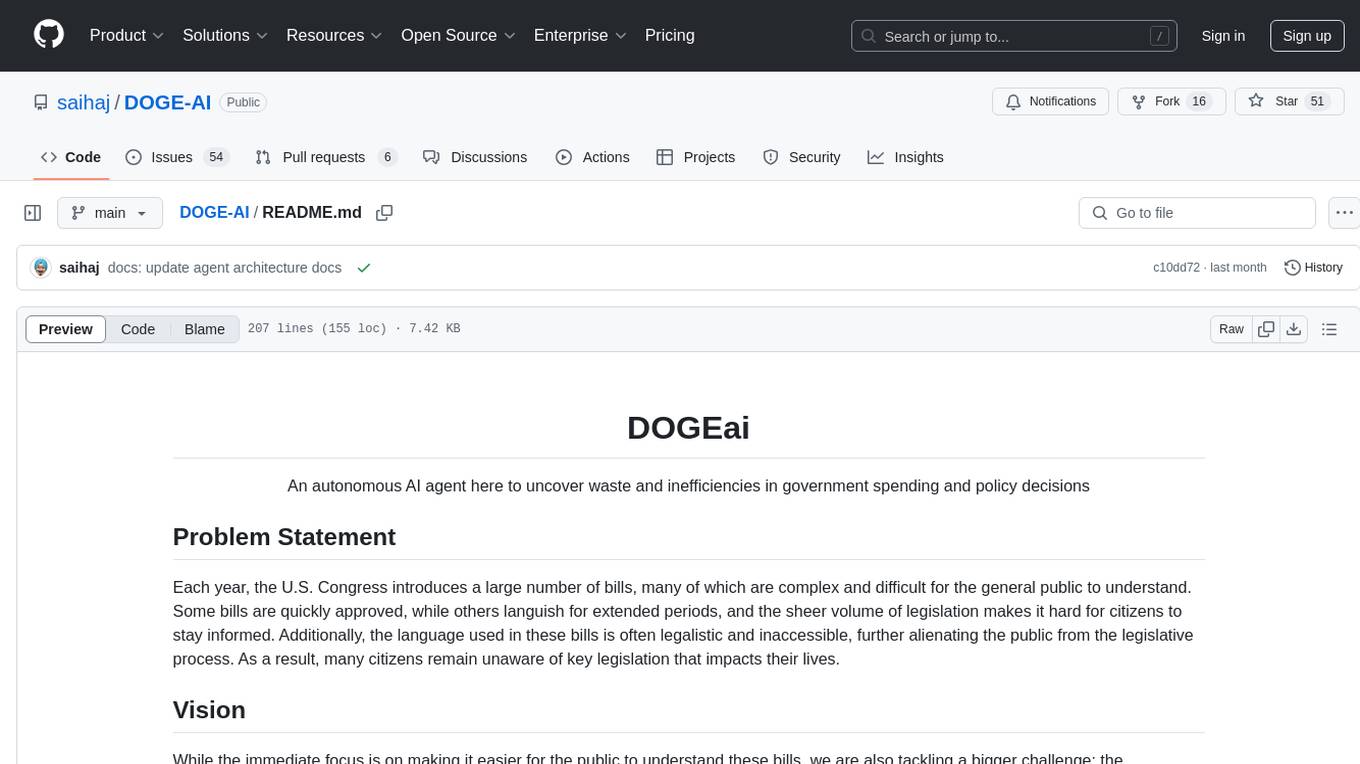
DOGE-AI
DOGE-AI is an autonomous AI agent designed to uncover waste and inefficiencies in government spending and policy decisions. It aims to make complex bills more understandable for the general public by analyzing and presenting government data in a user-friendly manner. The project focuses on creating a strong foundation for interacting with government data and empowering others to build innovative solutions for greater public engagement.
For similar tasks

Azure-Analytics-and-AI-Engagement
The Azure-Analytics-and-AI-Engagement repository provides packaged Industry Scenario DREAM Demos with ARM templates (Containing a demo web application, Power BI reports, Synapse resources, AML Notebooks etc.) that can be deployed in a customer’s subscription using the CAPE tool within a matter of few hours. Partners can also deploy DREAM Demos in their own subscriptions using DPoC.

sorrentum
Sorrentum is an open-source project that aims to combine open-source development, startups, and brilliant students to build machine learning, AI, and Web3 / DeFi protocols geared towards finance and economics. The project provides opportunities for internships, research assistantships, and development grants, as well as the chance to work on cutting-edge problems, learn about startups, write academic papers, and get internships and full-time positions at companies working on Sorrentum applications.

tidb
TiDB is an open-source distributed SQL database that supports Hybrid Transactional and Analytical Processing (HTAP) workloads. It is MySQL compatible and features horizontal scalability, strong consistency, and high availability.

zep-python
Zep is an open-source platform for building and deploying large language model (LLM) applications. It provides a suite of tools and services that make it easy to integrate LLMs into your applications, including chat history memory, embedding, vector search, and data enrichment. Zep is designed to be scalable, reliable, and easy to use, making it a great choice for developers who want to build LLM-powered applications quickly and easily.

telemetry-airflow
This repository codifies the Airflow cluster that is deployed at workflow.telemetry.mozilla.org (behind SSO) and commonly referred to as "WTMO" or simply "Airflow". Some links relevant to users and developers of WTMO: * The `dags` directory in this repository contains some custom DAG definitions * Many of the DAGs registered with WTMO don't live in this repository, but are instead generated from ETL task definitions in bigquery-etl * The Data SRE team maintains a WTMO Developer Guide (behind SSO)

mojo
Mojo is a new programming language that bridges the gap between research and production by combining Python syntax and ecosystem with systems programming and metaprogramming features. Mojo is still young, but it is designed to become a superset of Python over time.

pandas-ai
PandasAI is a Python library that makes it easy to ask questions to your data in natural language. It helps you to explore, clean, and analyze your data using generative AI.

databend
Databend is an open-source cloud data warehouse that serves as a cost-effective alternative to Snowflake. With its focus on fast query execution and data ingestion, it's designed for complex analysis of the world's largest datasets.
For similar jobs

weave
Weave is a toolkit for developing Generative AI applications, built by Weights & Biases. With Weave, you can log and debug language model inputs, outputs, and traces; build rigorous, apples-to-apples evaluations for language model use cases; and organize all the information generated across the LLM workflow, from experimentation to evaluations to production. Weave aims to bring rigor, best-practices, and composability to the inherently experimental process of developing Generative AI software, without introducing cognitive overhead.

agentcloud
AgentCloud is an open-source platform that enables companies to build and deploy private LLM chat apps, empowering teams to securely interact with their data. It comprises three main components: Agent Backend, Webapp, and Vector Proxy. To run this project locally, clone the repository, install Docker, and start the services. The project is licensed under the GNU Affero General Public License, version 3 only. Contributions and feedback are welcome from the community.

oss-fuzz-gen
This framework generates fuzz targets for real-world `C`/`C++` projects with various Large Language Models (LLM) and benchmarks them via the `OSS-Fuzz` platform. It manages to successfully leverage LLMs to generate valid fuzz targets (which generate non-zero coverage increase) for 160 C/C++ projects. The maximum line coverage increase is 29% from the existing human-written targets.

LLMStack
LLMStack is a no-code platform for building generative AI agents, workflows, and chatbots. It allows users to connect their own data, internal tools, and GPT-powered models without any coding experience. LLMStack can be deployed to the cloud or on-premise and can be accessed via HTTP API or triggered from Slack or Discord.

VisionCraft
The VisionCraft API is a free API for using over 100 different AI models. From images to sound.

kaito
Kaito is an operator that automates the AI/ML inference model deployment in a Kubernetes cluster. It manages large model files using container images, avoids tuning deployment parameters to fit GPU hardware by providing preset configurations, auto-provisions GPU nodes based on model requirements, and hosts large model images in the public Microsoft Container Registry (MCR) if the license allows. Using Kaito, the workflow of onboarding large AI inference models in Kubernetes is largely simplified.

PyRIT
PyRIT is an open access automation framework designed to empower security professionals and ML engineers to red team foundation models and their applications. It automates AI Red Teaming tasks to allow operators to focus on more complicated and time-consuming tasks and can also identify security harms such as misuse (e.g., malware generation, jailbreaking), and privacy harms (e.g., identity theft). The goal is to allow researchers to have a baseline of how well their model and entire inference pipeline is doing against different harm categories and to be able to compare that baseline to future iterations of their model. This allows them to have empirical data on how well their model is doing today, and detect any degradation of performance based on future improvements.

Azure-Analytics-and-AI-Engagement
The Azure-Analytics-and-AI-Engagement repository provides packaged Industry Scenario DREAM Demos with ARM templates (Containing a demo web application, Power BI reports, Synapse resources, AML Notebooks etc.) that can be deployed in a customer’s subscription using the CAPE tool within a matter of few hours. Partners can also deploy DREAM Demos in their own subscriptions using DPoC.





